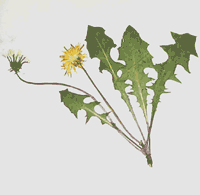Taraxacum officinale

Taxonomy: Magnoliophyta, Magnoliopsida (dicot), Compositae
Common names: dandelion, lion's teeth, blowball, pee in bed
Medicinal Uses:
Dandelion is extremely versatile, as the whole plant can be used for medicinal purposes as well as for culinary uses. All parts of the plant have a mild stimulating effect on the liver, and aid congestion. It has diuretic and detoxifying properties. Dandelion root encourages steady elimination of toxins. It is considered a safe diuretic, increasing both the water and waste products in the urine; hence the name "pee in bed". A fresh tincture is made of early spring roots for this purpose. The root also has therapeutic benefits for various ailments; such as constipation, skin problems (acne, eczema, and psoriasis). Dandelion also treats arthritic conditions, which include osteoarthritis and gout. In addition the root has had success in treating bronchitis and upper respiratory infections.
Dandelion leaves are unique as a diuretic, unlike conventional diuretics (which cause a loss of potassium) the leaves contain high levels of potassium (which cause a gain rather than a loss of potassium) in the body. Leaves also stimulate digestive function by increasing saliva production and promoting both stomach acid and digestive enzyme production. Dandelion leaves are also used to prevent gallstones.
People who have used the plant:
Dandelion is official and used in patent medicines.
Non-medicinal Uses :
For culinary uses, leaves are boiled and consumed like spinach. Raw leaves are added to salads, for its bitter taste. The roots of dandelion are used as a vegetable and as a coffee substitute, in which the roots are usually oven roasted then ground, although many people prefer the real stuff. Flowers are used to make wine. Dandelion as a whole contains a richer source of vitamin A than carrots.






0 Comments:
Post a Comment
<< Home